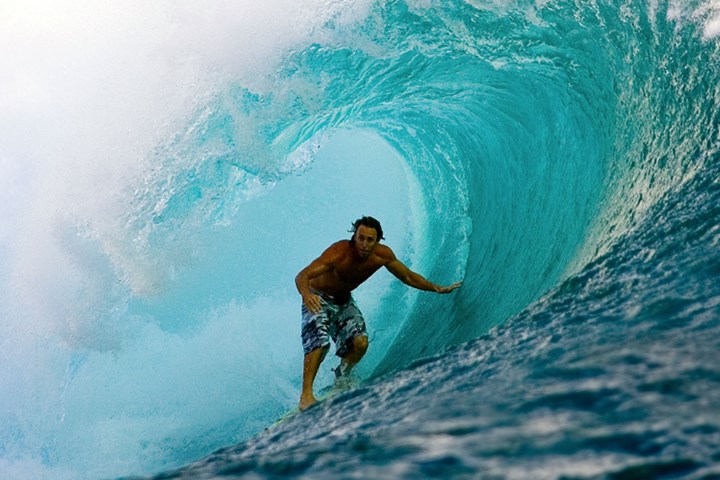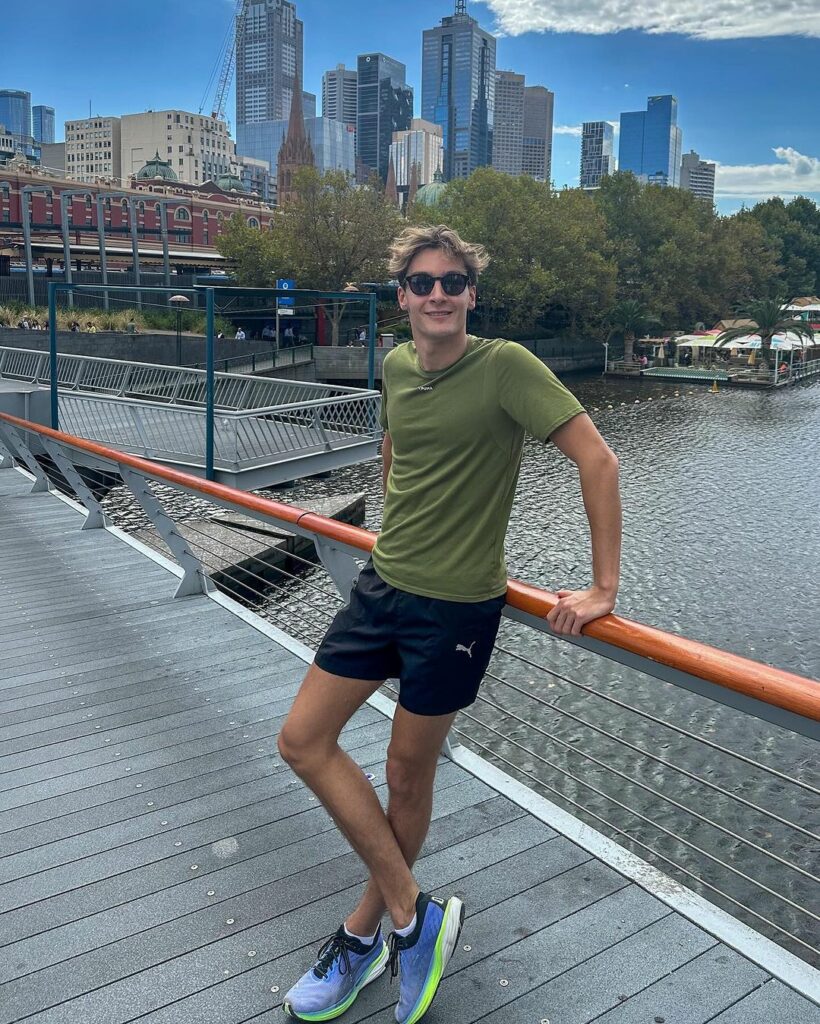
Mark Visser sat down with Men’s Health and spoke about overcoming his biggest fear and how he is trying to help others do the same too.
Rewrite Your Story
It’s possible Visser was never meant to be a surfer. Born on a farm outside Wangaratta in country Victoria, he was two when he dropped a peach into a sheep’s trough, dived in after it and had to be pulled out by his older brother. That experience may have set a course for a life where he could never quite escape the depths of his own insecurity. If it didn’t, a near drowning a couple of years later at Portsea on the Mornington Peninsula brought his fears right to the surface, instilling a dread of the ocean and torpedoing his self-confidence for years to come.
Had his family not moved to Mooloolaba in Queensland when Visser was 10, who knows whether he ever would have ridden a surfboard? Or if he’d still be afraid of the water.
Everyone in Mooloolaba surfed. Visser watched them from the shore in awe. The ocean had an irresistible pull, he says. He was drawn to it and at the same time terrified by it. You’ve probably had a similar object of fear and fascination. Maybe it’s a girl; perhaps it’s the idea of quitting your 9-5 to start your own business.
Eventually the water’s pull proved too strong. He started surfing every day and while he no longer feared drowning in a purely physical sense, he couldn’t shake the feeling that he wasn’t good enough. It was a feeling that would grow like a tapeworm inside him over the next 20 years.
Visser may have come to surfing late compared to his fellow grommets but he was stubborn enough to keep heading out and catching waves. He got better, winning some comps and attracting sponsors. Eventually he had a crack at pro surfing’s World Qualifying Series but as the pond got bigger the competition got steeper. Visser was coming to a realisation: small waves were not his strength or, frankly, his bag. He didn’t like catching a wave only to do one turn, then watch the water dribble away beneath him. As luck would have it a sponsor suggested he have a crack at big waves instead.
Visser never looked back. He finished runner-up in the Oakley ASL Big Wave Awards from 2008-2011. Perhaps it should have been enough to subdue his mental demons. But Visser’s thought processes were still corrupted by childhood insecurities, manifesting in a negative personal narrative: ‘I can’t do this because of that’. It was, he says, looking back, a defence mechanism devised by his ego. “Your ego wants to keep you safe by saying, you can’t do this, you’re going to die,” he says. “That thought process will stop you doing things so you can stay safe.”
You’ve probably got stories you tell yourself, fears you’ve suppressed and dreams you’ve buried. It could be something simple. You’d like to run a marathon but you can’t because you sucked at Cross Country back at school, so you never even consider it an option. Or maybe it’s something where the stakes are a little higher. Maybe you possess a hidden talent but you’re too afraid to expose yourself to public scrutiny because you’re not really an artist, writer, painter or chef and besides, what if people laughed at you? What if you failed? What if…
Visser believes negative thought processes haunt us all. He also believes it takes at least six months for most people to arrest damaging and self-defeating interior monologues. That’s most people. Visser? He took nine, leaving himself notes around the house to help rewire his brain to a positive default setting.
The hardest part, he warns, is making yourself vulnerable. “The key to taking on challenges is to be an open-hearted warrior without a weapon or padding,” he says. “When you’re vulnerable that’s when you’re open enough that you can become all you want to be.”
It takes hard work and persistence but once you x that faulty mental wiring and rewrite your story, Visser says, you reach a point where doubts become abstract rather than intrinsic, washing over you like waves. With no defence mechanism “protecting” him, there was nothing to stop Visser dreaming big. Like 60-foot big.
Drink The Water
During the four years of preparation it took to get Night Rider o the ground, Visser faced many potentially devastating obstacles and moments when he was close to quitting. In such times he’d often reflect on some advice that he’d once dismissed as the worst he’d ever received. It came from his manager Steve’s brother, tennis star Pat Rafter.
“I asked him ‘what’s the secret to success?’” Visser recalls. “I was looking for the silver bullet. He said ‘hard work, hard work and more hard work’. I remember looking at him and thinking, that is the shittest answer I’ve been given in my life.” Visser probed the tennis great for more. Because there had to be more, didn’t there?
“I was like, ‘ok cool, what else would you say there is?’ He looked at me like I was an idiot and said, ‘Man I just told you.’” Visser was reminded of the story a few years later when he heard a rather unique strategy for avoiding dehydration. “Someone said, ‘if you’re dehydrated, you’ve just got to drink some water’. Someone else then goes, ‘ok cool, do you need to add some magnesium, three of these things, two of those and they’re like, ‘no you just need to drink some water’.”
Visser’s new book The Big Wave Method is a master class in untangling the trip wires your mind puts in place to prevent you from achieving your dreams. It’s full of straight forward advice you could easily dismiss as simplistic or even self-evident if it hadn’t been written by someone who’s actually walked the walk. Through the course of the book Visser chips away at the mysticism we so often attach to extraordinary feats. Because even the most remarkable achievement, he argues, is ordinary, mundane even, once it’s broken down into its component parts.
“Sometimes the answer seems too obvious and so we try and find this magic bullet almost to prove how hard the challenge is,” Visser says. “The answer is just as simple as drink the fucking water.” And keep drinking it.
Prepare For The Worst
Ask Visser if he’s an adrenaline junkie and he laughs. “In comparison to other big-wave guys I’d consider myself a semi-pussy,” he says before adding, “when it comes to the moment, yes I’m in that warrior state of mind, but in the lead-up to Night Rider I was a bigger pussy than anyone. It was my ability to accept that and prepare accordingly that became my ultimate strength.”
The truth is to take on a monumental challenge you need to freak out a little. In doing so you make yourself put in the work. In the lead up to Night Rider, Visser trained with top free diver Anthony Williams, boosting his ability to hold his breath from an already remarkable four minutes to an astonishing six minutes. To get over his fear of sharks he researched their habits, then did a 26km paddle in the dark to assure himself he wouldn’t be eaten alive. A few days later he did a 100ft (30m) free dive onto a shipwreck where he knew sharks were likely to be hanging around. He’ll never know if they were there so dark was it at the bottom.
By the time it came to Night Rider, Visser estimates that from a risk-analysis perspective there was probably a 3-4 per cent chance of something really bad happening.
“The amount of preparation and training I put in was almost ridiculous, way above and beyond what was necessary,” he says. “If you prepare for the worst-case scenario, hope for the best and you end up somewhere in between then you’re still ahead.”
The Ocean Warrior course is available for download here. The course is priced at $499USD, but Ocean Warrior is running an exclusive deal for Men’s Health readers until Feb 11th. Click here for more.
Stay In The Moment
Five days before Night Rider Visser woke up in a cold sweat. “I was terrified, thinking ‘am I going to die?’” You’ve probably had similar experiences before an event that makes you anxious, whether it’s your first triathlon or a best man’s speech. You picture yourself in the situation. You catastrophise.
Few sports require you to be more in the moment than surfing yet the irony is, to prepare for that one massive moment, Visser needed to be consciously present in all the minor moments leading up to it.
“I would purposefully tell myself, ‘I’m thinking about what I have to do in five days but what have I got to do right now? I’ve got to go to training right now in this exact moment’.” For you, staying present could be as simple as maintaining strict form on chin-ups or feeling your chest hit the ground on every push-up.
This constant focus on the present had the ultimate reward during Night Rider when, after managing to absorb the fear that threatened to overwhelm him, Visser was able to take that moment on the board to look up at the stars.
At the same time, as he hurtled down the wave at nearly 80km/h, there were those words that kept ringing in his head. Words he’d been saying to himself for a very long time. Words that speak to surfing’s very essence: “stay on your feet”.
“I knew if I said ‘don’t fall o ’, all I’d hear would be ‘fall o ’,” Visser explains. “If you redirect your mind to only think what you want you’ve got more chance of achieving it.”
This kind of subtle mental manipulation informed every aspect of Visser’s physical and mental approach to Night Rider and continues today as he prepares for his next challenge, Operation Deep Blue, in which he’ll parachute out of a plane to surf the biggest wave in the world.
Whatever dream you set for yourself you’d be wise to apply a similar positive slant. The reason, as always, is simple. You can’t change the size of the swell, the length of a race or the gradient of a path. But what you can do is control the messages that ll your head. And whether you’re a surfer or not, when things hang in the balance what you tell yourself could be the difference between wiping out and the ride of your life.


















